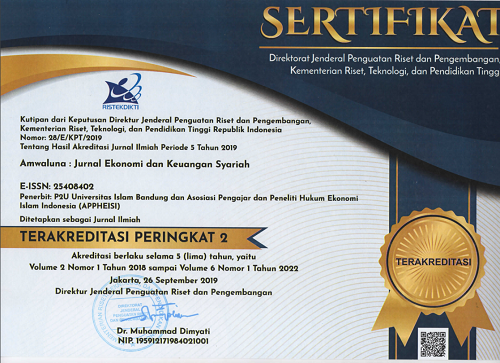The Potential Role of Qard Hasan Based Baitul Maal Wa Tamwil in Realizing Financial Inclusion
Abstract
This study aims to describe the potential role of the qard hasan-based Baitul Maal wa Tamwil (BMT) in achieving financial inclusion. This article uses a literature study approach accompanied by a case study. This study concludes that financial inclusion in society is very likely to be realized by the practice of the qard hasan contract at BMT. The implications of this research can be useful for policy makers related to BMT and Islamic microfinance more broadly. This can help policy makers and regulators understand the challenges and opportunities in supporting and promoting financial inclusion through BMTs.
Keywords
Full Text:
PDFReferences
Abdullah, R., & Ismail, A. G. (2014). Al-Tawhid in relation to the economic order of microfinance institutions. Humanomics, 30(4), 325–348. https://doi.org/10.1108/H-01-2014-0006
Abdullah, R., & Ismail, A. G. (2017). Taking stock of the waqf-based Islamic microfinance model. International Journal of Social Economics, 44(8), 1018–1031. https://doi.org/10.1108/IJSE-06-2015-0176
Ascarya, A. (2022). Developing cash waqf models for Baitul Maal wat Tamwil as integrated Islamic social and commercial micro fi nance. https://doi.org/10.1108/JIABR-09-2020-0267
Ascarya, A., & Masrifah, A. R. (2022). Strategies implementing cash waqf system for Baitul Maal wat Tamwil to improve its commercial and social activities. International Journal of Islamic and Middle Eastern Finance and Management. https://doi.org/10.1108/IMEFM-10-2020-0504
Ascarya, A., Sukmana, R., & Hosen, M. N. (2021). Integrated social and productive awqaf in Indonesia. In M. M. Billah (Ed.), Awqaf-led Islamic Social Finance (p. 245). Routledge.
Fianto, B. A., Gan, C., Hu, B., & Roudaki, J. (2018). Equity financing and debt-based financing: Evidence from Islamic microfinance institutions in Indonesia. Pacific Basin Finance Journal, 52(July 2017), 163–172. https://doi.org/10.1016/j.pacfin.2017.09.010
Haneef, M. A., Pramanik, A. H., Mohammed, M. O., Bin Amin, M. F., & Muhammad, A. D. (2015). Integration of waqf-Islamic microfinance model for poverty reduction: The case of Bangladesh. International Journal of Islamic and Middle Eastern Finance and Management, 8(2), 246–270. https://doi.org/10.1108/IMEFM-03-2014-0029
Herianingrum, S., & Shofawati, A. (2019). Model for microeconomic empowerment: Islamic microfinance institutions (Imis) in East Java. Articulos, 24(5), 317–326.
Jayengsari, R., & Husaeni, U. A. (2021). The Role of Baitul Maal wa Tamwil in Alleviating Poverty in Cianjur Regency, West Java. Amwaluna: Jurnal Ekonomi Dan Keuangan Syariah, 5(1), 56–66.
Nasir, A., & Abdullah, L. (2019). A new model for Islamic cooperative mortgage of housing finance. International Journal of Housing Markets and Analysis, 12(4), 708–721. https://doi.org/10.1108/IJHMA-06-2018-0044
Pupun Saepul Rohman, & Herianingrum, S. (2021). Baitul Maal wa Tamwil berbasis Wakaf untuk Membebaskan Masyarakat dari Riba. Al-Awqaf: Jurnal Wakaf Dan Ekonomi Islam, 12(2), 143–164. https://doi.org/10.47411/al-awqaf.v12i2.43
Rahman, R., & Nie, Q. (2011). The Synthesis of Grameen Bank Microfinance Approaches in Bangladesh. International Journal of Economics and Finance, 3(6). https://doi.org/10.5539/ijef.v3n6p207
Rohman, P. S., Fianto, B. A., Ali Shah, S. A., Kayani, U. N., Suprayogi, N., & Supriani, I. (2021). A review on literature of Islamic microfinance from 2010-2020: lesson for practitioners and future directions. Heliyon, 7(12), e08549. https://doi.org/10.1016/j.heliyon.2021.e08549
Rozzani, N., Mohamed, I. S., & Syed Yusuf, S. N. (2017). Risk management process: Profiling of islamic microfinance providers. Research in International Business and Finance, 41(April), 20–27. https://doi.org/10.1016/j.ribaf.2017.04.009
Sadr, S. K. (2017). The optimum size of rotating qarḍ ḥasan savings and credit associations. ISRA International Journal of Islamic Finance, 9(1), 15–26. https://doi.org/10.1108/IJIF-07-2017-003
Selim, M. (2019). The effectiveness of Qard-al-Hasan (interest free loan) as a tool of monetary policy. International Journal of Islamic and Middle Eastern Finance and Management, 12(1), 130–151. https://doi.org/10.1108/IMEFM-07-2017-0187
Sholihin, M., Zaki, A., & Maulana, A. O. (2018). Do Islamic rural banks consider Islamic morality in assessing credit applications? Journal of Islamic Accounting and Business Research, 9(4), 498–513. https://doi.org/10.1108/JIABR-01-2018-0015
Snyder, H. (2019). Literature review as a research methodology: An overview and guidelines. Journal of Business Research, 104(July), 333–339. https://doi.org/10.1016/j.jbusres.2019.07.039
Tarmizi, E. (2013). Harta Haram MuaMaalat Kontemporer. Berkah Mulia Insani Publishing.
Wulandari, P. (2019). Enhancing the role of Baitul Maal in giving Qardhul Hassan financing t o the poor at the bottom of the economic pyramid: Case study of Baitul Maal wa Tamwil in Indonesia. Journal of Islamic Accounting and Business Research, 10(3), 382–391. https://doi.org/10.1108/JIABR-01-2017-0005
Wulandari, P., Kassim, S., Adhi Kasari Sulung, L., & Iwani Surya Putri, N. (2016). Unique aspects of the Islamic microfinance financing process. Humanomics, 32(3), 230–247. https://doi.org/10.1108/H-09-2014-0062
Zada, N., & Saba, I. (2013). The Potential Use of Qarḍ Ḥasan In Islamic Microfinance. ISRA International Journal of Islamic Finance, 5(2), 153–162. https://doi.org/10.12816/0002775
Zauro, N. A., Saad, R. A. J., & Sawandi, N. (2020). Enhancing socio-economic justice and financial inclusion in Nigeria: The role of zakat, Sadaqah and Qardhul Hassan. Journal of Islamic Accounting and Business Research. https://doi.org/10.1108/JIABR-11-2016-0134
Official Gazette of Statistics Central Bureau of Statistics No. 08/01 / Th.XXIII, 15 January 2020. Accessed via https://www.bps.go.id/pressrelease-penduduk-miskin-september-2019-turun-menjadi-9-22-persen.html
Baitul Maal LPI Al Muttaqin Financial Report 2008 - 2019
DOI: https://doi.org/10.29313/amwaluna.v7i2.7608
Refbacks
- There are currently no refbacks.
Editorial Office:
Syariah Faculty, Universitas Islam Bandung
Jalan Tamansari No. 24-26 Kota Bandung

Amwaluna : Jurnal Ekonomi dan Keuangan Syariah is licensed under a Creative Commons Attribution-NonCommercial-ShareAlike 4.0 International License.








